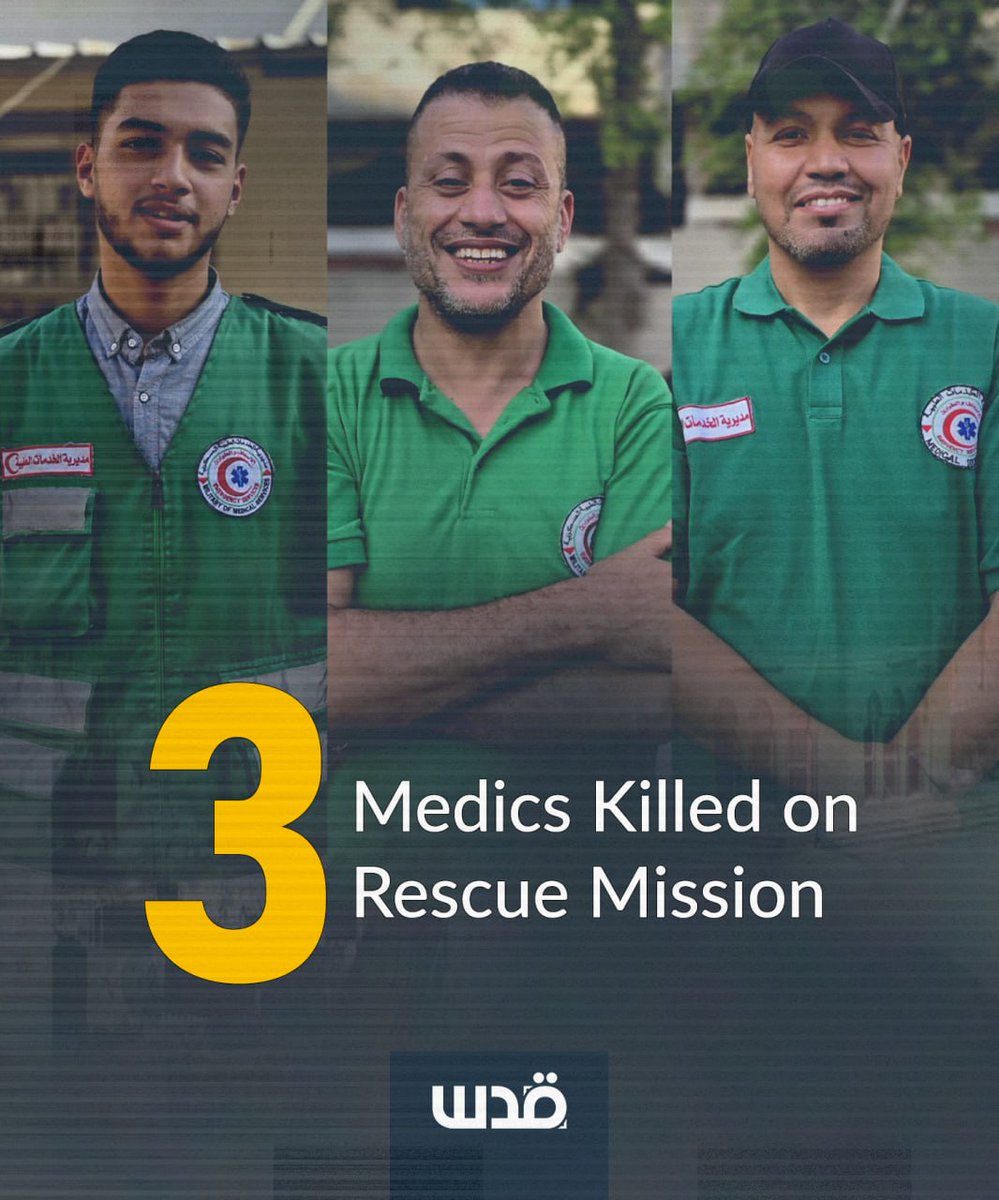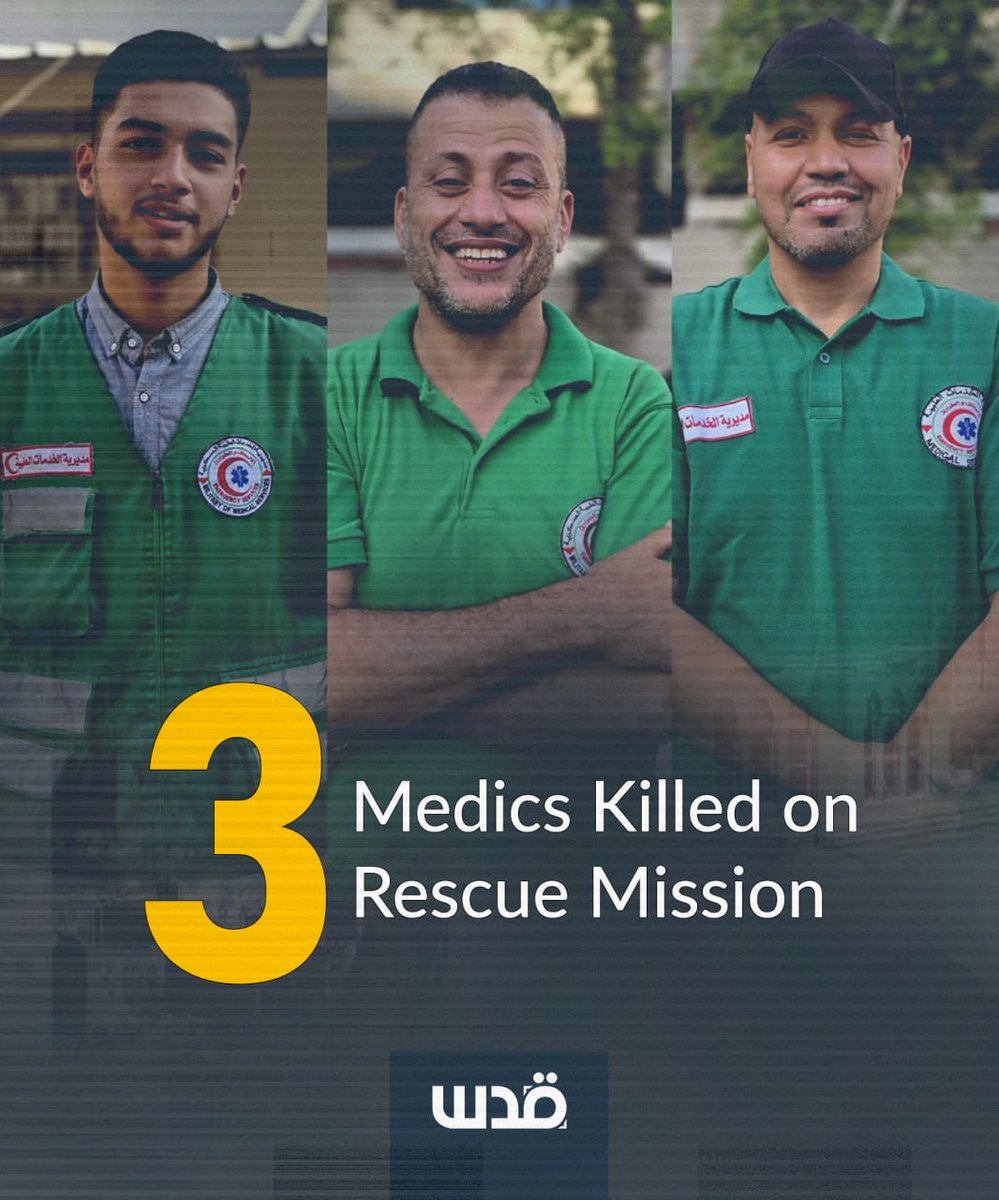Outrage as Israeli Strike Kills Three Medics on Rescue Mission
Tragic Loss of Life in Gaza: Three Paramedics killed in Israeli Attack
On June 9, 2025, a devastating incident unfolded in the Al-Tuffah neighborhood of east Gaza, as three dedicated paramedics lost their lives during a rescue mission. The tragic event, reported by Quds news Network, highlights the ongoing violence and humanitarian crisis in the region, raising serious concerns about the safety of medical personnel and the impact of conflict on civilian life.
The Incident
The paramedics, identified as Baraa Afana, Hussein Mheisen, and Wael Al-Attar, were actively engaged in providing essential medical assistance when they were tragically killed in an Israeli airstrike. Their commitment to saving lives in a conflict-ridden environment underscores the crucial role that medical professionals play in times of war, often putting their own safety at risk to help others.
The Humanitarian Crisis in Gaza
This incident is not isolated; it reflects the broader humanitarian crisis that has persisted in Gaza for many years. The region has been a focal point of conflict, resulting in significant loss of life, widespread destruction, and a dire need for medical and humanitarian assistance. The killing of paramedics, who are meant to be protected under international law, raises urgent questions about the conduct of military operations and the protection of civilians and medical personnel in conflict zones.
The Role of Paramedics in Conflict Zones
Paramedics are essential to emergency medical services, especially in war-torn areas where injuries from bombings and other violent acts are prevalent. They are trained to provide immediate care, stabilize patients, and transport them to hospitals. The loss of three paramedics not only represents a significant personal tragedy for their families and communities but also diminishes the already scarce medical resources available to the people of Gaza.
- YOU MAY ALSO LIKE TO WATCH THIS TRENDING STORY ON YOUTUBE. Waverly Hills Hospital's Horror Story: The Most Haunted Room 502
International Response and Implications
The international community often watches these tragedies unfold with growing concern, yet responses have been varied and often insufficient. Human rights organizations have consistently called for accountability and the protection of medical personnel in conflict settings. The deaths of Afana, Mheisen, and Al-Attar could reignite calls for investigations into the conduct of military operations in Gaza and emphasize the need for international humanitarian law to be upheld.
The Importance of Awareness
Raising awareness about incidents like this is crucial in promoting understanding of the realities faced by those living in conflict zones. The public must be informed about the risks that paramedics and other medical personnel face daily. Social media plays a significant role in disseminating information quickly, as seen in the Twitter post from Quds News Network that brought attention to this tragic loss.
The Call for Action
This heartbreaking event serves as a reminder of the urgent need for peace and resolution in the region. Stakeholders, including governments and international organizations, must prioritize dialogue and diplomacy to address the underlying causes of the conflict. Furthermore, there should be a concerted effort to ensure the safety of medical workers and civilians in all areas affected by violence.
Conclusion
The loss of Baraa Afana, Hussein Mheisen, and Wael Al-Attar is a tragic reminder of the human cost of conflict and the importance of protecting those who are dedicated to saving lives. As the situation in Gaza continues to evolve, it is imperative for the international community to advocate for the protection of medical personnel and to work towards a sustainable peace that prioritizes the safety and well-being of all civilians. In remembering the sacrifices of these brave individuals, we must also commit to taking action to prevent further loss of life and to support those who continue to serve on the front lines of humanitarian efforts.

Breaking | Three paramedics killed in Israeli attack while on a rescue mission in Al-Tuffah Neighborhood, east Gaza.
The medics are Baraa Afana, Hussein Mheisen and Wael Al-Attar. pic.twitter.com/gDu5upBLjJ
— Quds News Network (@QudsNen) June 9, 2025
Breaking | Three paramedics killed in Israeli attack while on a rescue mission in Al-Tuffah Neighborhood, east Gaza
On June 9, 2025, a tragic incident unfolded in the Al-Tuffah Neighborhood of east Gaza, where three dedicated paramedics lost their lives during a rescue mission. These brave individuals—Baraa Afana, Hussein Mheisen, and Wael Al-Attar—were working tirelessly to save lives amidst the ongoing conflict, highlighting the perilous conditions healthcare workers face in war zones. The news sent shockwaves through the community and beyond, drawing attention to the high risks associated with providing emergency medical care in such volatile environments.
The Role of Paramedics in Conflict Zones
Paramedics are often the unsung heroes in crises, especially in regions affected by conflict. Their commitment to saving lives is unwavering, even in the face of danger. In Gaza, where tensions are high and violence can erupt unexpectedly, paramedics like Baraa, Hussein, and Wael risk their lives daily to ensure that the injured receive prompt medical attention. Their work is not just about treating injuries; it’s about preserving dignity and humanity in situations that often strip away both.
The Circumstances Surrounding the Attack
Details surrounding the attack that claimed the lives of these three medics reveal a grim reality. They were on a rescue mission, a critical operation that required them to navigate through dangerous areas. The Israeli attack on June 9 was not an isolated incident but part of a broader context of violence that has plagued the region for decades. Reports indicate that the attack was aimed at a location where civilians were gathered, raising serious questions about the targeting of emergency responders during conflict. This incident underscores the urgent need for adherence to international humanitarian laws that protect medical personnel in conflict zones.
The Impact on the Community
The loss of Baraa Afana, Hussein Mheisen, and Wael Al-Attar resonates deeply within the Gaza community. These individuals were not only professionals but also friends and family members, deeply rooted in their neighborhoods. Their untimely deaths represent a significant loss, both personally and professionally, for those who knew and worked with them. The community’s grief is palpable, as they mourn the loss of individuals who dedicated their lives to helping others, often at great personal risk.
Reactions from the Medical and Global Community
News of the paramedics’ deaths has sparked outrage and condolences from various organizations and individuals worldwide. Humanitarian organizations have called for an immediate investigation into the circumstances of the attack, emphasizing the need for accountability. The International Committee of the Red Cross (ICRC) has reiterated the importance of protecting medical personnel in conflict situations, stating that “attacks on healthcare are unacceptable.” This sentiment reflects a growing recognition of the critical role that healthcare workers play, especially in conflict zones where their services are urgently needed.
Understanding the Broader Context
This tragic incident must be viewed within the broader context of the Israeli-Palestinian conflict, which has produced a cycle of violence affecting countless lives. The ongoing hostilities have created a humanitarian crisis in Gaza, with civilians often caught in the crossfire. The targeting of medical personnel not only violates international laws but also exacerbates the suffering of those in desperate need of care. As the situation persists, it raises important questions about the future of healthcare in conflict zones and the protection of those who serve in these critical roles.
Honoring the Memory of Baraa, Hussein, and Wael
As we reflect on the lives of Baraa Afana, Hussein Mheisen, and Wael Al-Attar, it’s essential to honor their memory by advocating for the safety of all healthcare workers. The global community must unite in calling for an end to violence against medical personnel and a commitment to ensuring that those who dedicate their lives to saving others can do so without fear. Memorials and tributes are being organized to honor their sacrifice, reminding us all of the human cost of conflict and the importance of protecting those who serve on the frontlines of health care.
The Path Forward: Advocacy for Change
In light of these tragic events, it’s crucial for citizens and organizations worldwide to advocate for change. This includes pushing for stronger protections for medical personnel in conflict zones, as well as calling for accountability for those who perpetrate violence against them. Raising awareness about the challenges faced by paramedics and other healthcare workers in Gaza can also help foster a greater understanding of the humanitarian crisis unfolding in the region. Engaging in conversations, sharing stories, and supporting organizations that focus on humanitarian aid are vital steps that individuals can take to contribute to the cause.
Conclusion: A Call for Peace and Protection
The heartbreaking loss of Baraa Afana, Hussein Mheisen, and Wael Al-Attar serves as a stark reminder of the fragility of life in conflict zones. Their dedication to saving lives in the face of danger exemplifies the spirit of humanity that must be preserved, even amidst chaos. It is our collective responsibility to advocate for peace, protect those who provide medical care, and ensure that their sacrifices are not forgotten. Only through awareness, compassion, and action can we hope to create a world where such tragedies no longer occur.
“`
This article provides a comprehensive overview of the incident involving the three paramedics, while also emphasizing the broader implications and the need for change. It is structured with engaging headings and detailed, reader-friendly paragraphs.

